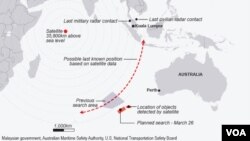BEIJING —
A special envoy of Chinese President Xi Jinping met with Malaysia's Prime Minister Wednesday to press for more information about the fate of missing flight MH370. As public anger grows in China over Malaysia's handling of the search and mystery of just what happened to the plane, Beijing is stepping up its demands on Kuala Lumpur. Its unclear what broader impact the tragedy might have.
During his meeting with Malaysian officials, China’s Vice Foreign Minister Zhang Yesui called for unremitting efforts in the search for the missing plane. Much like the families of those on board, the Chinese government has repeatedly demanded more information from Malaysian officials in the wake of the crash.
Those demands have grown increasingly this week since Malaysia announced the plane had gone down in the southern Indian Ocean.
Chinese families rallied outside the Malaysian Embassy in Beijing Tuesday, demanding that Kuala Lumpur tell them the truth. Online, Chinese called for a boycott of Malaysian goods and travel to the Southeast Asian nation, which until now has been a popular destination for Chinese tourists.
Travel agencies say that bookings to Malaysia have been falling severely since the plane disappeared with many looking at other destinations for vacation.
China's Foreign Ministry has also demanded that Kuala Lumpur show it all of the data that was used to make Monday's determination and has repeatedly pressed Malaysian authorities for correct information.
Joseph Cheng, a political science professor at the City University of Hong Kong, says the Chinese government is facing a difficult balancing act by being firm with Malaysia, but also sensitive to the needs of family members. He said that China's sending of an envoy and Malaysia's sending of a delegation to Beijing to meet with families here is part of that process.
"Certainly the Chinese authorities have to respond favorably to the demands to the grievances of the victims' group. However Malaysia has been maintaining good relations with China and Chinese leaders have no intention to unduly embarrass the Malaysian authorities," said Cheng.
On Wednesday, Malaysian officials met with the families of those on board at a hotel in Beijing and attempted to explain the data that shows the plane went down in the southern Indian Ocean. They also took questions, one of which was whether they thought relations between the two countries would remain friendly.
Zhang Jie, an Asia Pacific security analyst in Beijing says that although emotions have been running high, those feelings are likely to cool over time.
"The way the Malaysian government has handled this airplane accident has created some negative consequences," Zhang said. "Maybe because of their attitude or because of the lack of technical skills of Malaysia. Whether that will have an impact on relations between the two nations remains to be seen."
"I don't think the incident will have much impact on the bilateral relationship although for a little bit of time there may well be some impact on the number of tourists going to Malaysia which has been a favorite destination with Chinese tourists, I don't think a boycott of Malaysian goods and so on will have any serious lasting effect," said Joseph Cheng.
Malaysia was the first ASEAN nation to recognize China and Beijing is the country's biggest trading partner. The two are looking to strengthen security ties as well and boosting military cooperation and trade even further. Last year, the two signed a treaty that raised relations to that of a "comprehensive strategic partnership."
And while China and Malaysia have disagreements over territory in the South China Sea, analysts say that relations on a whole are good compared to Beijing's ties with other nations in the region.
During his meeting with Malaysian officials, China’s Vice Foreign Minister Zhang Yesui called for unremitting efforts in the search for the missing plane. Much like the families of those on board, the Chinese government has repeatedly demanded more information from Malaysian officials in the wake of the crash.
Those demands have grown increasingly this week since Malaysia announced the plane had gone down in the southern Indian Ocean.
Chinese families rallied outside the Malaysian Embassy in Beijing Tuesday, demanding that Kuala Lumpur tell them the truth. Online, Chinese called for a boycott of Malaysian goods and travel to the Southeast Asian nation, which until now has been a popular destination for Chinese tourists.
Travel agencies say that bookings to Malaysia have been falling severely since the plane disappeared with many looking at other destinations for vacation.
China's Foreign Ministry has also demanded that Kuala Lumpur show it all of the data that was used to make Monday's determination and has repeatedly pressed Malaysian authorities for correct information.
Joseph Cheng, a political science professor at the City University of Hong Kong, says the Chinese government is facing a difficult balancing act by being firm with Malaysia, but also sensitive to the needs of family members. He said that China's sending of an envoy and Malaysia's sending of a delegation to Beijing to meet with families here is part of that process.
"Certainly the Chinese authorities have to respond favorably to the demands to the grievances of the victims' group. However Malaysia has been maintaining good relations with China and Chinese leaders have no intention to unduly embarrass the Malaysian authorities," said Cheng.
On Wednesday, Malaysian officials met with the families of those on board at a hotel in Beijing and attempted to explain the data that shows the plane went down in the southern Indian Ocean. They also took questions, one of which was whether they thought relations between the two countries would remain friendly.
Zhang Jie, an Asia Pacific security analyst in Beijing says that although emotions have been running high, those feelings are likely to cool over time.
"The way the Malaysian government has handled this airplane accident has created some negative consequences," Zhang said. "Maybe because of their attitude or because of the lack of technical skills of Malaysia. Whether that will have an impact on relations between the two nations remains to be seen."
"I don't think the incident will have much impact on the bilateral relationship although for a little bit of time there may well be some impact on the number of tourists going to Malaysia which has been a favorite destination with Chinese tourists, I don't think a boycott of Malaysian goods and so on will have any serious lasting effect," said Joseph Cheng.
Malaysia was the first ASEAN nation to recognize China and Beijing is the country's biggest trading partner. The two are looking to strengthen security ties as well and boosting military cooperation and trade even further. Last year, the two signed a treaty that raised relations to that of a "comprehensive strategic partnership."
And while China and Malaysia have disagreements over territory in the South China Sea, analysts say that relations on a whole are good compared to Beijing's ties with other nations in the region.
We are sorry, but this feature is currently not available







